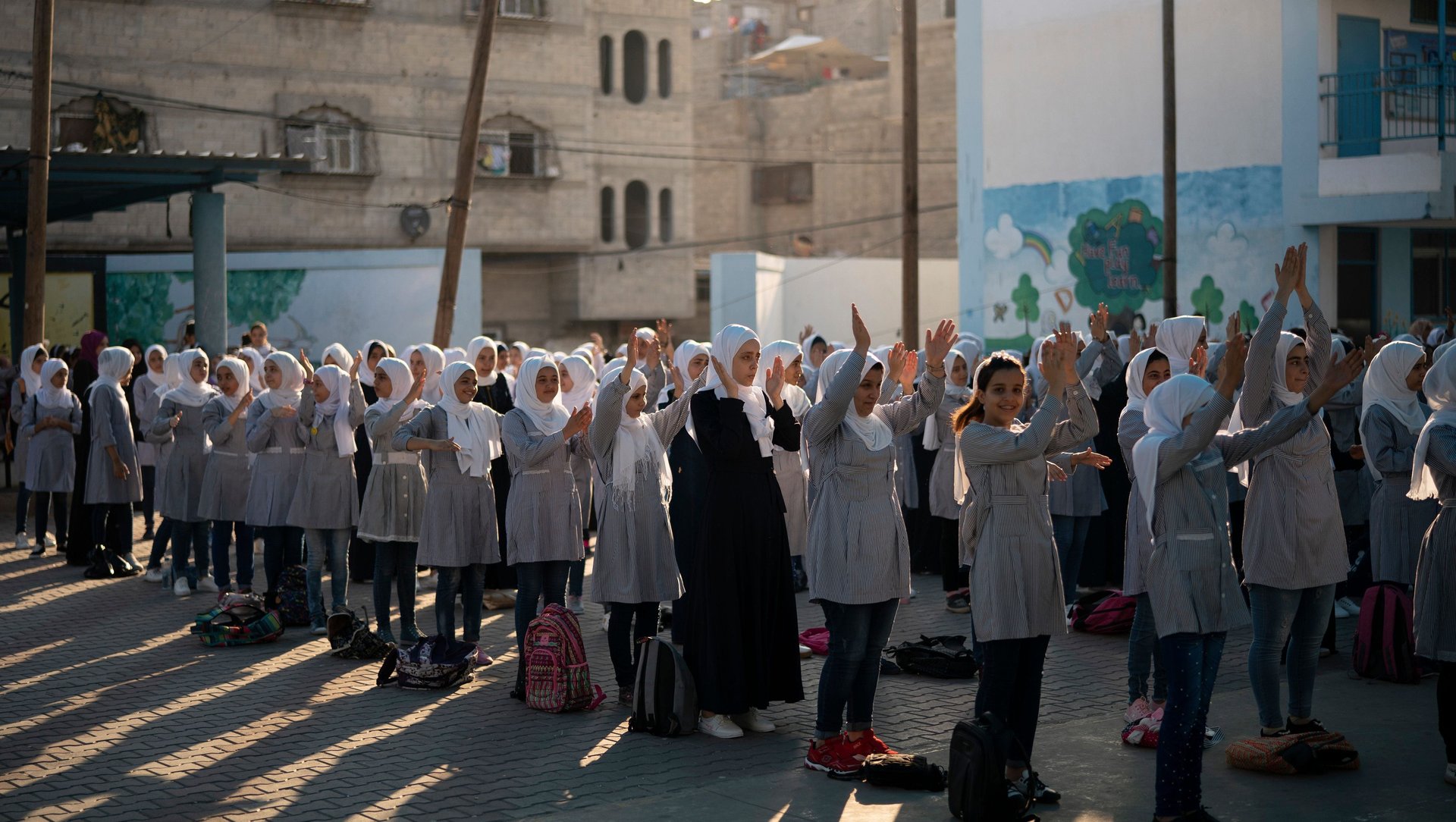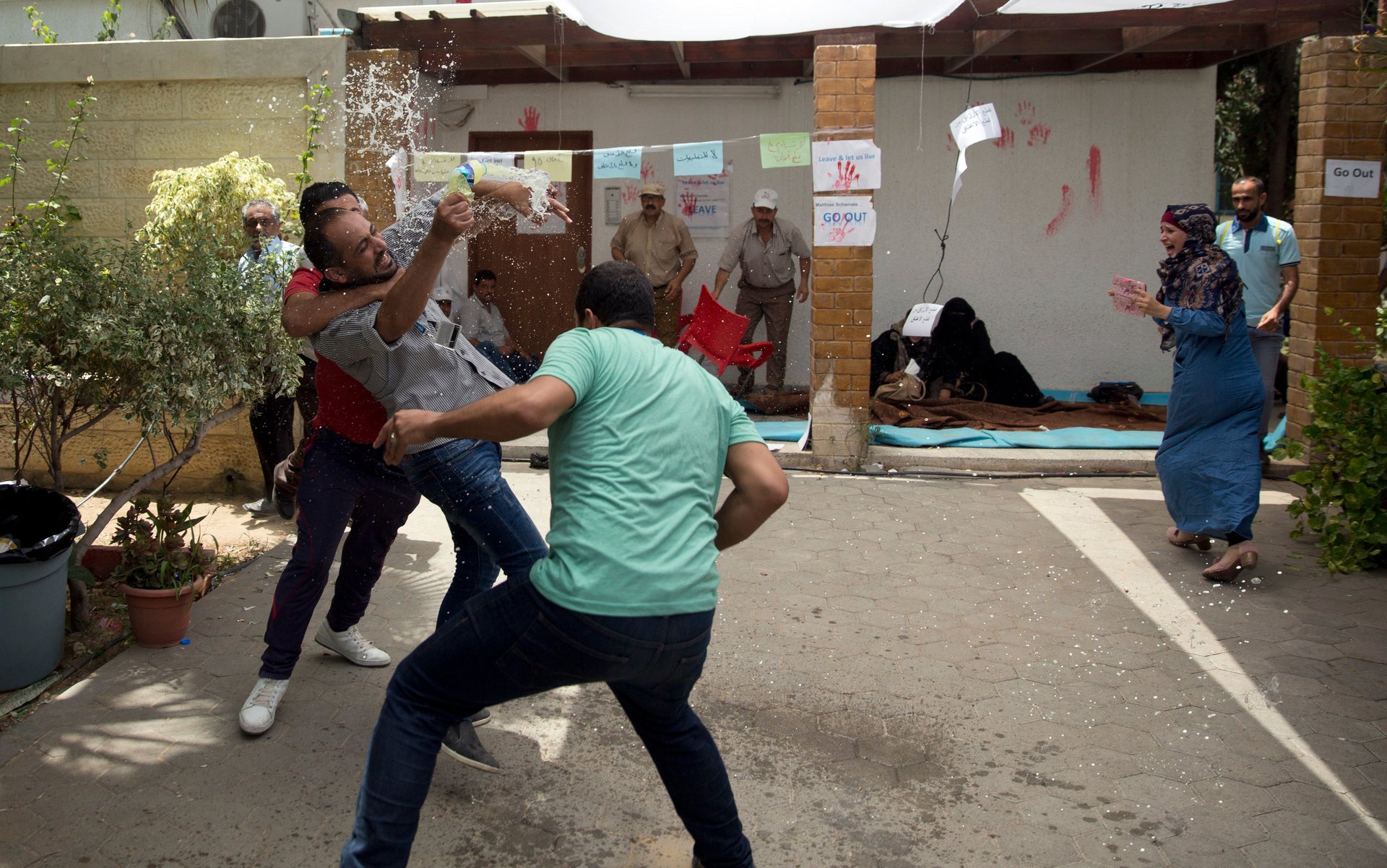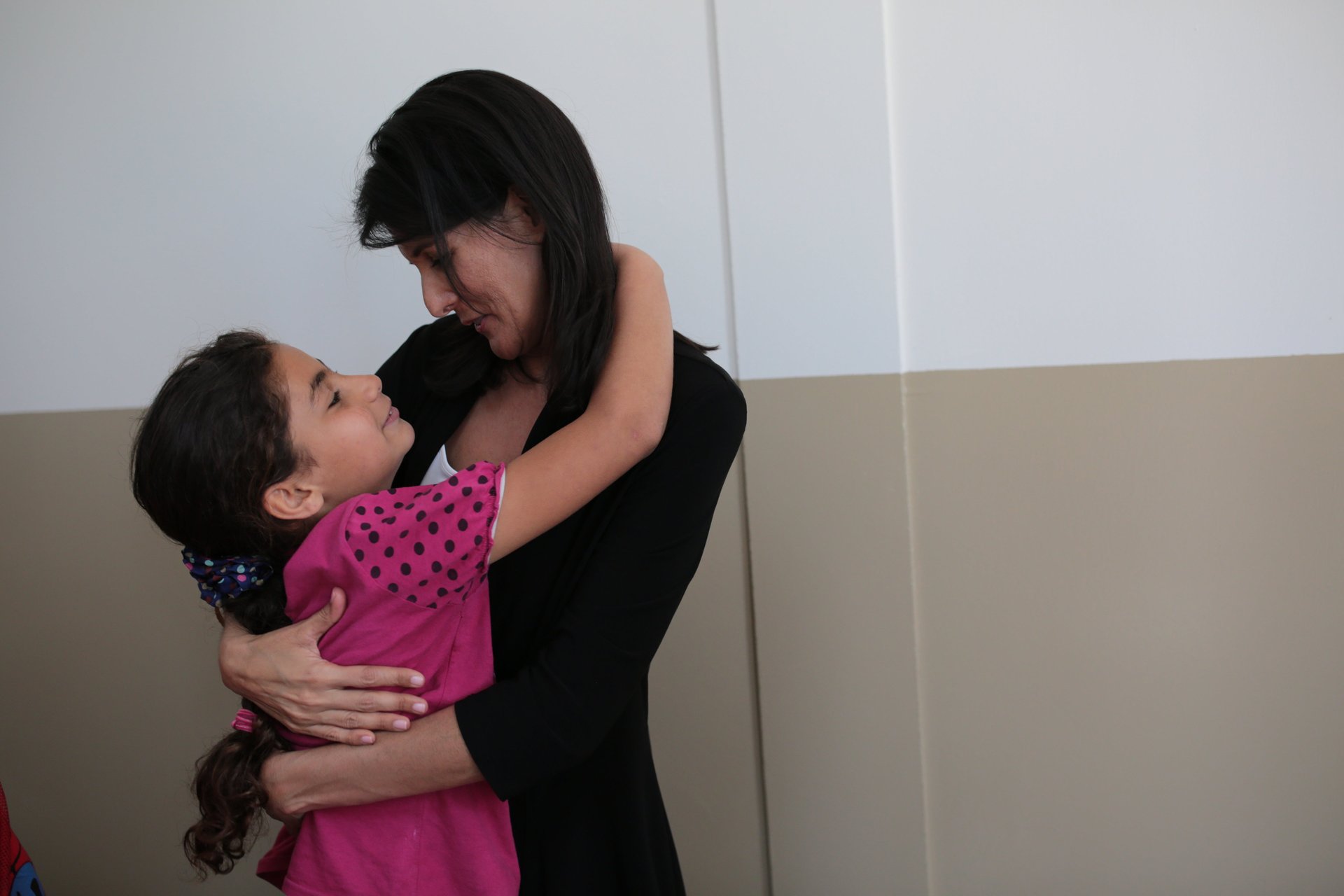As UN ambassador, Nikki Haley hugged refugees, then turned her back
In June 2017, Nikki Haley made a trip to the vast Gaza Strip refugee camps that shelter millions of displaced Palestinians.


In June 2017, Nikki Haley made a trip to the vast Gaza Strip refugee camps that shelter millions of displaced Palestinians.
There, Donald Trump’s ambassador to the United Nations got a “chance to talk with girls & women about their lives, their hopes, & their dreams,” she said on Twitter. She added photos of herself with her arm around young women, and listening attentively to middle-aged ones. She visited UN-funded schools in the region, stopping to hug some of the 500,000 Palestinian kids who are educated by the UN’s Relief and Works Agency.
About 15 months later, the US cut its funding for the refugee camps entirely. The decision blew a $350 million hole in UNRWA’s budget for Palestinian refugees’ food and education. Other countries should share the US’s responsibility, Haley said, ahead of the cut. Later, she criticized the Palestinian Authority for continuing to “bash America.”
For UNRWA officials and the refugees in their care, it was a bitter disappointment, but part of a familiar pattern.
Haley channeled Trump’s “diplomacy of revenge”
Under Trump, the United States’s once pivotal role in the United Nations has shrunk. Formerly one of the most powerful defenders of human rights and refugees on the planet, the US is now guided by what Foreign Policy magazine dubbed the “diplomacy of revenge.”
The UNRWA was just one target of the Trump administration’s transactional approach to foreign aid and human rights. As UN ambassador, Haley pulled the US out of the science and cultural agency UNESCO, and participation in the Global Compact on Migration, declaring it “inconsistent” with the Trump administration’s “immigration principles.”
She withdrew the US from the UN Human Rights Council, after members criticized Israel, then accused Amnesty International and other rights groups of siding with Russia and China when they complained. She wrote threatening letters to less powerful nations, suggesting she would pull aid funding to them, unless they sided with the US on crucial UN votes, said several diplomats at this year’s UN General Assembly.
It’s not what the human rights community expected. Louis Charbonneau, the United Nations director at Human Rights Watch, said he had expected Haley would “provide a conscience for the Trump administration.” After all, as governor, Haley had removed the Confederate flag from South Carolina state property, and criticized Trump’s anti-immigrant rants before the 2016 election.
At times, Haley did follow in the steps of her predecessors. She condemned human rights offenses in Saudi Arabia, China, and Nicaragua, skillfully used Trump’s “madman” reputation to convince China to support US sanctions on North Korea, and made human rights a focus of the Security Council meeting she chaired. She pushed for an arms embargo in South Sudan, and to end the persecution of political opposition in the DRC.
But that work was “swept off the table after she pulled out of the UN human rights council for hard-to-justify reasons,” Charbonneau said. In June, the US left the council, accusing it of bias against Israel. The Trump administration was “thumbing its nose” at human rights worldwide, Charbonneau said. Haley and the Trump administration soon stopped talking to Human Rights Watch and other major activist groups entirely, they say.
It’s hard to know whether Haley pushed back the Trump administration, though aides say she made human rights a central part of internal conversations. Activists say her legacy will be the shrinking of US moral authority.
“Haley will leave her post having caused long-term damage to key international human rights bodies and having put the United States in the company of some of the worst human rights abusers,” the ACLU said as Haley stepped down.
By pulling UNRWA funding, the US “wrote itself out of the role of peacemaker” in the Middle East, Brookings wrote in September. Exiting the human rights council also showed the Trump administration was too lazy to do the “hard labor” required to be a global leader, the think tank said this June.
Haley’s office refutes this characterization. “Ambassador Haley has made the protection of human rights a priority of her tenure, a priority that will remain until she departs,” a spokesperson for the mission said.
Funding cuts for UNRWA
Surprisingly, UNRWA commissioner general Pierre Krähenbühl received a warm welcome in Washington, DC in Nov. 2017, officials say. “In every high-level meeting, he received nothing but praise for everything he does,” said Elizabeth Campbell, the director of the DC office of the UNRWA. The agency even got a letter certified by the comptroller of the State Department’s bureau of refugees and migration, pledging $45 million for food aid in Gaza, never to be fulfilled.
As is the case in many Trump administration foreign policy situations, it was unclear whether the White House, the State Department, or someone else was actually making decisions. A few months later, in Jan. 2018, Haley threatened to slash the UNRWA’s funding during a press conference, citing Palestine’s unwillingness to return to the negotiating table with Israel. In August, the State Department cut its funding completely, forcing the agency to choose between food, education, and jobs for the refugees it protects.
“We just simply ran out of money,” explained Krähenbühl. “When you run out of money, you have to make hard choices,” he said. The agency cut 180 staff jobs in the Gaza Strip, he said, something he “deeply regrets.” The job cuts sparked strikes and protests that made the area so unsafe that UNRWA’s foreign employees had to be evacuated. One employee tried to set himself on fire:

Still, by choosing job cuts and not food aid cuts, the agency “protected food distribution for a million people” on the Gaza strip, Krähenbühl said.
As it scrambled to raise money from other countries, the UNRWA started new austerity measures. They included cutting community mental health services, increasing their class sizes to 50 students, and trimming some 7,000 families deemed no longer worthy from the monthly emergency food aid rolls, meaning they’d no longer get free lentils, rice, beans, sugar, and flour.
There was also unquantifiable damage, UNRWA officials said. “Part of the impact is the extraordinary anxiety and uncertainty, the sense of helplessness and hopelessness” for all of the families living in the area, said Campbell.
Other nations, including Jordan, Germany, and Sweden, scraped together funding from their budgets; the UNRWA has managed to make up 85% of the US-caused shortfall, Krähenbühl said last month.
Empty words in Syria
Haley visited Syrian refugees at a camp in southern Turkey in May of 2017, too, again hugging children, talking to girls, pledging to “bring new life” to the efforts to help refugees, and helping to pack them boxes of lentils and bulgur wheat.
“I think ‘America First’ is human rights and ‘America First’ is humanitarian issues,” Haley told reporters then. “It’s what we’ve always been known for.”

Despite Haley’s words, though, the Trump administration was slamming the door on Syrian refugees. The US has resettled just a few dozen Syrian refugees in the first half of this fiscal year, down from over 12,000 in the 2016 fiscal year. Haley has harshly criticized Russia’s actions in Syria, but been unable or unwilling to push for the US to accept the any of the millions fleeing the war. Refugees “want to stay as close to Syria as they can,” she claimed in April, as the US and other coalition members were bombing the region.
The global contract on migration the US withdrew from in late 2017 asked nations to commit to “principles aimed at improving conditions for refugees and other migrants,” and to share the burden of assistance fairly. It was non-binding, but Haley called it “simply not compatible with U.S. sovereignty.”
Over 6,000 civilians have been killed in the Syrian conflict this year. Syrian refugees trying to flee into Turkey are being shot by Syrian guards at the border
Where Haley goes now
Haley’s long-term political plans remain a mystery. The only explanation that she gave about her resignation from the UN post was that after eight years in public office, six of them as governor, she was too tired to go on.
“I think it’s just very important for government officials to understand when it’s time to step aside,” Haley said. “And I do think that sometimes it’s good to rotate in other people who can put that same energy and power into it.”
“It was a blessing to go into the UN with body armor every day and defend America. And I’ll always do that,” she said. “But I will tell you that I think it’s time.”